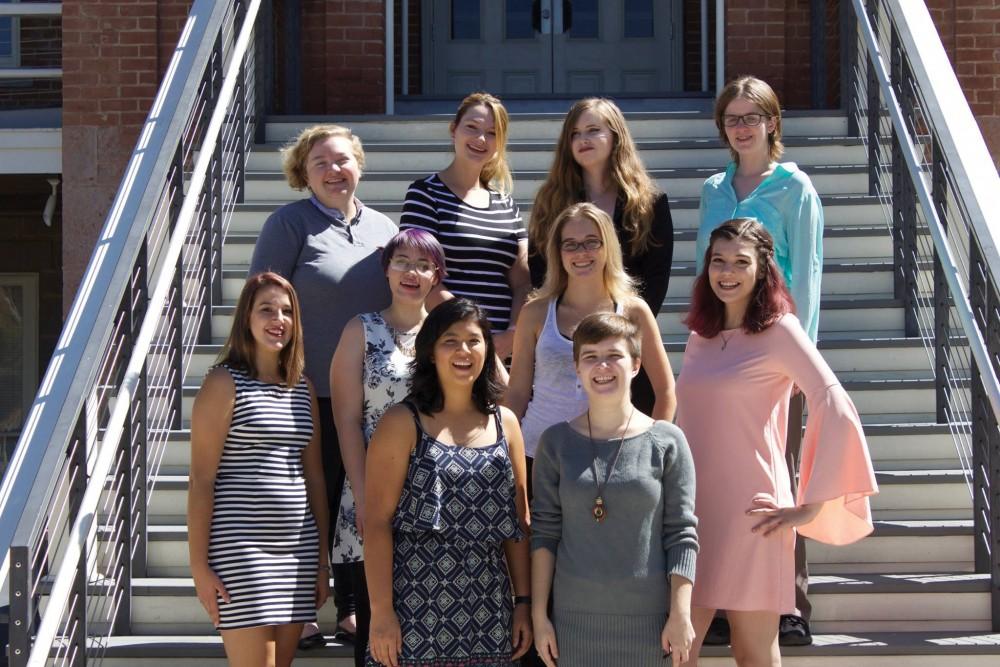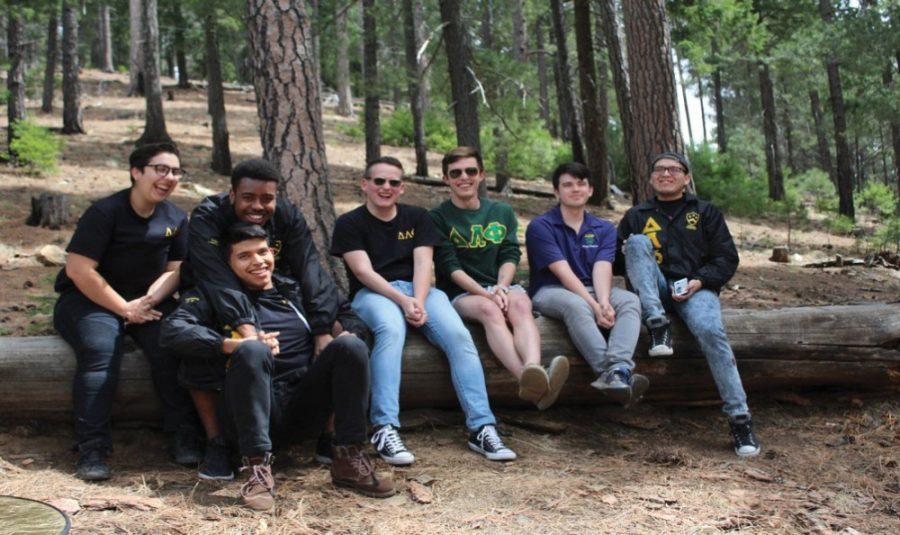With 56 fraternities and sororities on-campus, Greek Life is a significant aspect of University of Arizona culture. Although Greek Life is steadily becoming more inclusive, LGBTQ+ involvement in fraternities and sororities is a relatively new subject.
According to the National Multicultural Greek Council, multicultural fraternal organizations began to rise on college campuses in the 1980s, after the Civil Rights movement.
RELATED: UA cultural centers embrace campus diversity
“Most of our predominantly white organizations had exclusionary clauses, so you had to be white in order to join, and that wasn’t really lifted until the late 70s, early 80s,” said Marcos Guzman, senior coordinator for UA Fraternity & Sorority Programs. “Students of color couldn’t join, so a lot of culturally- and multiculturally-based organizations started to pop up to meet the needs of students of color who wanted to join fraternal organizations.”
Now, there are thousands of cultural- and identity-based chapter houses across the U.S. At the UA there are more than 20 organizations founded by members of minority groups.
“Those exclusionary clauses don’t exist anymore,” Guzman said. “All of our organizations are all inclusive, including those that are cultural and identity based. You don’t have to be Latina to join a Latina organization, you just have to appreciate that portion of their founding.”
Despite this diversity, LGBTQ+ fraternal organizations are few and far between. Such organizations began sprouting only a decade or so ago and are very new to the fraternal community.
There are only two social Greek organizations at the UA for LGBTQ+ students — Delta Lambda Phi and Gamma Rho Lambda.
Both belong to the United Sorority and Fraternity Council, the UA council for cultural and identity fraternal organizations. USFC is comprised of 11 fraternities and six sororities.

According to Guzman, members of the LGBT community exist in all of the UA Greek Life counsels, but there are no statistics to help gauge how numerous LGBTQ+ students are within UA fraternal organizations.
“Our organizations are value based, our organizations are accepting, their whole purpose is to make students feel like they are welcome,” Guzman said.
While most fraternal organizations in the U.S. cannot necessarily exclude LGBTQ+ characters from membership — and some even have specific policies of non-discrimination that are explicitly inclusive of LGBTQ+ members — there is often a lack of understanding between members.
This lack of education and miscommunication is often why, although fraternities and sororities are non-discriminatory, LGBTQ+ individuals may benefit from social fraternities and sororities.
“You can be gay in another fraternity and be accepted, but you may still hear lots of slurs or ‘that’s so gay’ — like we’re in fifth grade,” said Brandon Neth, senior and President of Delta Lambda Phi, an all-inclusive fraternity for LGBTQ+ and progressive men. “That can be really discouraging because you’re supposedly brothers with these individuals, but they are saying that stuff.”
According to Neth, despite the progress society has made to acceptance and the growing awareness of the LGBTQ+ community, there is an obvious air of heteronormativity in Greek life that is hard to escape. He said this is because of how long fraternities and sororities have existed — some for hundreds of years.
“Fraternities and sororities are things that are built on tradition [that connect you to the past],” Neth said. “I think that connecting to your past is good, but with that comes baggage that also connects you to the ideals and viewpoints of the past. It takes a little more to break those heteronormative ideas than it would otherwise.”
Lexie Palmer, junior and president of the all-inclusive LGBTQ+ sorority Gamma Rho Lambda, had trouble choosing a chapter house because of this, as Palmer identifies as neither male nor female.
RELATED: Memorable moments on the screen: a peek into the Loft Cinema’s Lesbian Look film and video series
Because of their gender identity, Palmer had difficulty choosing an organization when they decided they wanted to be a part of Greek life.
“I had this assumption of what Greek Life was — of what Interfraternity and Panhellenic Council is — and that wasn’t really what I wanted, especially because of the way I identify,” Palmer said. “Typically, sororities use the term ‘sisters’, and I wouldn’t really be comfortable being in an organization that refers to me as something I am not.”
Although Palmer was sure if a non-binary or gender nonconforming person wished to join a fraternity or sorority the organization would be very accommodating, Palmer appreciates the unique environment Gamma Rho Lambda provides, where they can be themself.
“It’s not that other organizations on campus are not accepting of the LGBT community, that is so not the case,” Neth said. “But [Gamma Rho Lambda and Delta Lambda Phi are] more overt about it. Because it is such a queer-accepting environment, the heteronormativity is no longer there.”
There is no doubt that social exclusivity is one of the greatest appeals of Greek life, according to Guzman. Trying to balance that appeal with nondiscrimination is a difficult task sometimes.
Each organization has their own set of values, their own set of principles. When they are looking for new members, they are looking for people who align with their values and principles.
“The line between inclusivity and exclusivity in Greek life is a very interesting dichotomy,” Neth said. “Greek Life, by definition, is an exclusive thing. And that can cause social biases because you essentially have the ability to select the exact kind of person you want.”
This is why Fraternity and Sorority Programs exists: to encourage fraternities and sororities to understand that values and principles of individual personality is completely separate from race, nationality, economic class, disability, sexuality, gender or gender identity.
“Every day I am blown away by everything that [FSP] does to push chapters towards being inclusive of sexuality, race, socioeconomic class, disabilities, all kinds of things that FSP is doing to push chapters to be better,” Neth said.
FSP enforces Standards of Excellence, an accreditation program that every chapter must complete and live up to: Academics, Leadership & Involvement, Global Citizenship & Human Dignity, Chapter Management, Membership Education & Development, Recruitment/Outreach and Health and Wellness.
As part of Global Citizenship and Human Dignity, all chapters are asked to host events and educational opportunities where they may learn something about different cultures or identities that their chapter may not fully align to.
RELATED: ‘Diva La Paz’ celebrates 22nd annual show with ‘Pride Center’ unveiling
“An example would be, if your organization is predominantly white men, we want you to engage in certain opportunities that allow you to learn about different cultures, different identities, that are distinctly different than the norm in your organization,” Guzman said.
FSP has various educational opportunities every year, like an ongoing speaker series that 40 percent of every chapter is required to attend that helps educate and promote awareness on different, high profile topics. There is one talk every semester—something about a current issue in the fall and spring break safety in the spring.
On Sept. 12, this semester’s talk will be about campus racism.
There has never been a speaker on LGBTQ+ issues, but it is something that FSP is actively looking into.
“What we can do, as educators, is educate on these types of topics,” Guzman said. “What do you do if a brother comes out, how to listen and talk with them and how to show that they care? Because that is what we are all about—brotherhood, sisterhood, we like to use the term ‘siblinghood’.”
The LGBTQ Resource Center also has many programs designed to encourage inclusiveness and awareness all across campus, not just within fraternities and sororities—like the Safe Zone, a training program aiming to shift campus attitude towards the LGBTQ+ community.
“Most fraternities have principles that are about improving yourself,” Nesh said. “There is no reason that shouldn’t include people who aren’t like you.”
Follow Daily Wildcat on Twitter









